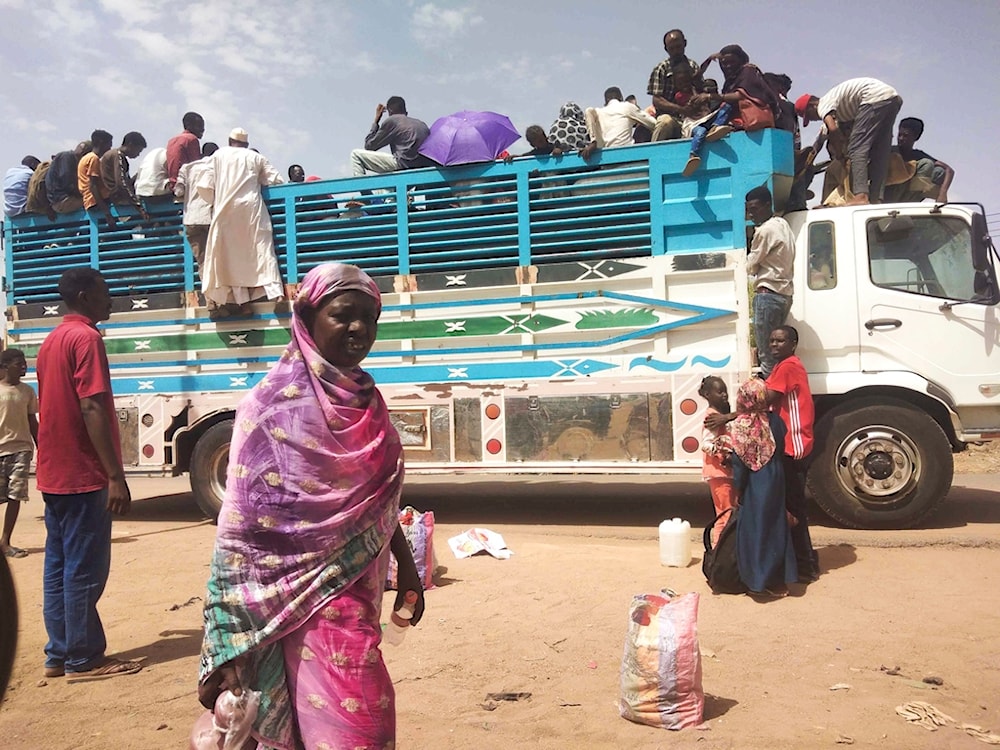Sudanese army blocks aid deliveries to RSF-controlled Darfur
The UN has revealed that authorities have blocked the border, shutting the corridor or relief aid, and restricting the Darfur-Chad cross-border operation.
-

People board a truck as they leave Khartoum, Sudan, on June 19, 2023. (AP)
As the war accelerates in Sudan, authorities loyal to the Sudanese army blocked aid deliveries to the Darfur region, one of the most affected regions by the war, a movie decried by aid workers and the United States.
For over two decades in Darfur, the Rapid Support Forces (RSF) have employed the "scorched earth" war tactic, involving the deliberate widespread destruction of property and resources. Currently, the RSF has captured four out of the five major cities in the region.
Due to the destruction the region is seeing, almost 650,000 Darfur citizens fled to the bordering country of Chad, but many remain stuck in the face of the dangers of war and blocked aid.
In this context, the United Nations, which had already been limiting its Darfur-Chad cross-border operation, revealed that authorities have blocked the border, shutting the corridor for relief aid, and restricting the operation itself, the World Food Program's country director Eddie Rowe said.
US State Department spokesperson Matthew Miller relayed that the US has deep concerns regarding the army's decision to block and impede aid and assistance from reaching areas controlled by the RSF.
However, the Sudanese foreign ministry, loyal to the Sudanese Army Forces (SAF), has denied all US allegations, calling them "false accusations", and also revealed that the Chad-Darfur border was being used to smuggle weapons that allowed the RSF to "commit atrocities" in the region.
The blockage of aid would have detrimental effects on Darfur, which is already struggling. An international aid worker told AFP that "Children and babies are already dying from hunger and malnutrition. There will be an immense human impact... and quite possibly large-scale mortality rates."
UN report exposes abuse on civilians
On Friday, the UN reported that abuses potentially constituting war crimes, including indiscriminate attacks on civilian locations, such as hospitals, markets, and displaced camps, have been committed by both sides in Sudan's ongoing conflict.
"Some of these violations would amount to war crimes," Volker Turk, the UN High Commissioner for Human Rights, said in a statement accompanying the report. "The guns must be silenced, and civilians must be protected."
In further detail, the report highlighted instances, where individuals escaping violence or displaced by conflict became casualties of explosive weapons attacks. In a specific incident in Zalingei, Darfur, between September 14-17, the RSF shelled a camp, resulting in the killing of numerous displaced individuals.
On August 22, under a bridge, 26 civilians, predominantly women and children, were killed by shells reportedly launched by the Sudanese Armed Forces. Additionally, the report noted the adoption of a military strategy by the RSF, involving the use of human shields, as testified by victims.
The report detailed incidents in the capital, Khartoum, where numerous individuals were apprehended and positioned outside near RSF military posts as a deterrent against air strikes from Sudanese fighter jets.
UN investigators have also recorded instances of sexual violence impacting 118 individuals, including a woman who was detained and subjected to repeated gang rape for several weeks, with many of the assaults attributed to RSF members.
Read more: Sudan: A borderless conflict

 3 Min Read
3 Min Read








